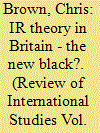| Srl | Item |
| 1 |
ID:
074801


|
|
|
|
|
| Publication |
2006.
|
| Summary/Abstract |
First, the nature and extent of the turn to history and narrative in the study of international relations.
Second, the contribution of narrative history to IR theory, not as an adjunct or empirical resource, but as a theoretical perspective in its own right. Narrative historians of international relations may not adhere to an explicit theory of international relations but they do practice an implicit philosophy of history, a philosophy as sophisticated and theoretically fertile as any other IR theoretical approach.
|
|
|
|
|
|
|
|
|
|
|
|
|
|
|
|
| 2 |
ID:
074795


|
|
|
|
|
| Publication |
2006.
|
| Summary/Abstract |
The international organisation of the democratic peace matters. Interdemocratic institutions are particularly suited to block escalation pathways between states and to prevent conflicts from resulting in war. This article builds on findings from three fields of research: (a) the liberal analysis of the democratic peace; (b) systemic approaches to international institutions, and (c) new quantitative studies of armed conflicts. Three pivotal contributions of international institutions to peaceful conflict management are identified: international institutions can be used to overcome the security dilemma among states and to tame power competitions. They sustain international cooperation and forestall the recourse of governments to unilateral self-help strategies. Finally, international institutions increase the autonomy of issue areas, which decreases the risk of destabilising spillover effects from other issue areas. The article holds that these three functions are extraordinarily well performed by international institutions composed of democracies and illustrates this allegation by presenting three case studies of interdemocratic management of former rivalries. Therefore, the distinctive features of interdemocratic institutions merit more attention as a supplement to the explanation of the democratic peace.
|
|
|
|
|
|
|
|
|
|
|
|
|
|
|
|
| 3 |
ID:
074800


|
|
|
| 4 |
ID:
074799


|
|
|
|
|
| Publication |
2006.
|
| Summary/Abstract |
David Campbell has been at the forefront of showing how deconstruction, and the philosophy of Jacques Derrida, can help us to think international relations differently. Like Derrida himself, Campbell has eschewed the goal of an ethical theory in favour of an 'ethos of political criticism' concerned to question and go beyond our assumptions and limits. In order to continue such an ethos of criticism, to push our understanding of ethics in international relations further still, it is surely important to question the assumptions and limits Campbell himself imposes. It is with this in mind that I wish to take a particular political intervention by Derrida in 1993 and read it against Campbell's Derridean analysis of the Bosnian conflict which began in 1992.
|
|
|
|
|
|
|
|
|
|
|
|
|
|
|
|
| 5 |
ID:
074798


|
|
|
|
|
| Publication |
2006.
|
| Summary/Abstract |
Immanuel Kant is today often invoked as an emblematic figure for Europe. In works by thinkers such as Zygmunt Bauman, Jacques Derrida, Michel Foucault and Jürgen Habermas, among others, Kant's work stands as a core reference for discussions of the European Modern and the legacy of the Enlightenment, even if this appropriation is not uncritical. The spectre of Kant also haunts Europe in more pedestrian understandings of the ideal. Prominent politicians such as Gerhard Schroeder, Joschka Fischer, Dominique de Villepin and Romano Prodi have all paid tribute to his influence, while in a variety of popular-academic texts Kant's 'cosmopolitical' dream has been invoked as a paradigm for Europe - if not a shorthand for the European social model tout court.
|
|
|
|
|
|
|
|
|
|
|
|
|
|
|
|
| 6 |
ID:
074796


|
|
|
|
|
| Publication |
2006.
|
| Summary/Abstract |
The Special Court for Sierra Leone (SCSL) is located in a fortified compound in central Freetown. Inside its militarised space a project of global significance is unfolding. Together with the International Criminal Tribunal for the former Yugoslavia, the International Criminal Tribunal for Rwanda, and the International Criminal Court, the SCSL is an experiment in bringing the rule of international law and governance to regions recently destabilised by war and conflict.
|
|
|
|
|
|
|
|
|
|
|
|
|
|
|
|
| 7 |
ID:
074797


|
|
|
|
|
| Publication |
2006.
|
| Summary/Abstract |
This article considers the rise and fall of the first institution of international academic cooperation on international relations, the International Studies Conference (ISC), which was established in 1928 and continued activities into the 1950s. Its formation preceded by decades the present ISA as well as the international organisation of political scientists. The demise of the ISC was a result of the failings of the ISC itself, the influence of UNESCO especially its Department of Social Sciences, and the challenge posed to the ISC by the formation of the International Political Science Association.
|
|
|
|
|
|
|
|
|
|
|
|
|
|
|
|